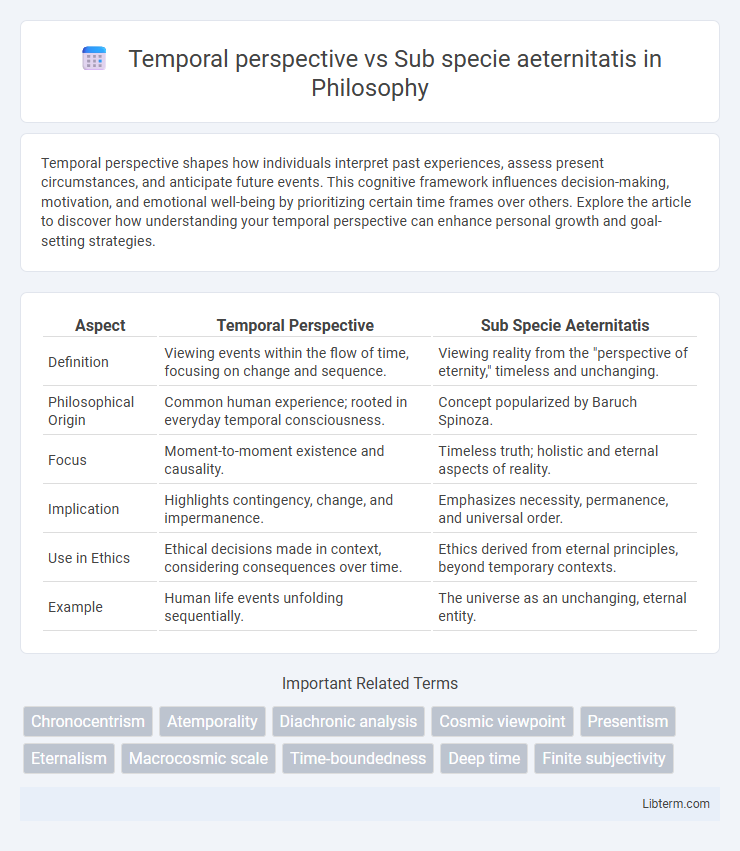Temporal perspective shapes how individuals interpret past experiences, assess present circumstances, and anticipate future events. This cognitive framework influences decision-making, motivation, and emotional well-being by prioritizing certain time frames over others. Explore the article to discover how understanding your temporal perspective can enhance personal growth and goal-setting strategies.
Table of Comparison
| Aspect | Temporal Perspective | Sub Specie Aeternitatis |
|---|---|---|
| Definition | Viewing events within the flow of time, focusing on change and sequence. | Viewing reality from the "perspective of eternity," timeless and unchanging. |
| Philosophical Origin | Common human experience; rooted in everyday temporal consciousness. | Concept popularized by Baruch Spinoza. |
| Focus | Moment-to-moment existence and causality. | Timeless truth; holistic and eternal aspects of reality. |
| Implication | Highlights contingency, change, and impermanence. | Emphasizes necessity, permanence, and universal order. |
| Use in Ethics | Ethical decisions made in context, considering consequences over time. | Ethics derived from eternal principles, beyond temporary contexts. |
| Example | Human life events unfolding sequentially. | The universe as an unchanging, eternal entity. |
Understanding Temporal Perspective
Understanding temporal perspective involves perceiving events as they unfold within the flow of time, highlighting changes, causality, and the sequence of moments. This contrasts with the sub specie aeternitatis viewpoint, which considers reality from a timeless, eternal standpoint, transcending temporal limitations to grasp existence as a whole. Emphasizing temporal perspective allows for a nuanced comprehension of human experience, decision-making, and historical context grounded in temporal progression.
Defining Sub Specie Aeternitatis
Sub specie aeternitatis, a Latin phrase meaning "from the perspective of eternity," defines a viewpoint that transcends temporal constraints and views events as part of a timeless, universal whole. This philosophical concept contrasts with the temporal perspective, which focuses on the sequential flow of time and human experience limited to the present moment. Understanding sub specie aeternitatis involves recognizing a broader, metaphysical vantage point that situates existence beyond the bounds of chronological time.
Historical Origins of Both Concepts
The temporal perspective, rooted in ancient philosophical traditions such as Aristotelian and Stoic thought, emphasizes the unfolding of events within time and human experience. The concept of sub specie aeternitatis, famously articulated by Baruch Spinoza in the 17th century, frames reality from the viewpoint of eternity, transcending temporal limitations to grasp the essence of existence. These distinct historical origins highlight the contrast between perceiving life through time-bound narratives and an eternal, atemporal standpoint.
Temporal Perspective in Everyday Life
Temporal perspective shapes how individuals interpret experiences by emphasizing past memories, present emotions, and future expectations, influencing decision-making and emotional regulation. This viewpoint fosters goal-setting and prioritization, enabling people to adapt behavior according to temporal context and immediate challenges. Understanding temporal perspective in everyday life aids in improving mental health, motivation, and interpersonal relationships through time-conscious awareness.
Philosophical Roots of Sub Specie Aeternitatis
The philosophical roots of Sub specie aeternitatis trace back to Baruch Spinoza, who introduced this concept as viewing reality from the perspective of eternity, transcending temporal limitations. This Eternalist perspective contrasts with the temporal viewpoint that perceives events sequentially, emphasizing the unchanging, infinite nature of existence rather than transient moments. The concept highlights the distinction between finite human experience and the infinite, timeless understanding of the universe.
Contrasting Worldviews: Time-Bound vs Timeless
Temporal perspective emphasizes human experience through a time-bound lens, highlighting events as transient and situated within past, present, and future contexts. Sub specie aeternitatis adopts a timeless viewpoint, perceiving reality from an eternal standpoint that transcends individual moments and historical changes. Contrasting these worldviews reveals the tension between finite human existence and the infinite, unchanging nature of reality.
Cognitive Implications of Temporal Thinking
Temporal perspective shapes human cognition by anchoring thoughts in sequential time frames, enabling anticipation, reflection, and planning. Sub specie aeternitatis offers a timeless viewpoint that promotes detachment and broader existential understanding, reducing emotional biases tied to immediate experiences. Integrating both perspectives enhances decision-making and emotional regulation by balancing present-focused awareness with enduring cosmic context.
Ethical Impacts of an Eternal Perspective
Adopting a temporal perspective centers ethical decisions on immediate consequences and human experiences within finite lifespans, emphasizing empathy and accountability. In contrast, the sub specie aeternitatis viewpoint, or "under the aspect of eternity," encourages evaluating actions through an infinite timescale, fostering a sense of universal responsibility and moral impartiality. Ethical impacts of this eternal perspective include promoting sustainability, impartial justice, and long-term welfare transcending individual or cultural biases.
Integrating Both Views in Modern Philosophy
Integrating temporal perspective and sub specie aeternitatis in modern philosophy enriches understanding by balancing human experience with eternal objectivity, allowing for a comprehensive grasp of existence. This synthesis acknowledges the dynamic, temporal flow of life while situating it within a timeless framework, enhancing both ethical deliberation and metaphysical insights. Contemporary thinkers employ this dual lens to address complex issues like identity, morality, and meaning, fostering philosophical models that reflect both finite conditions and universal truths.
Practical Applications and Personal Growth
Temporal perspective emphasizes living fully in the present moment, fostering mindfulness and emotional resilience, which enhances daily decision-making and stress management. Sub specie aeternitatis, or viewing life from the "eternal perspective," encourages detachment from fleeting concerns, promoting long-term vision and a deeper sense of purpose that supports personal growth and ethical reflection. Integrating both perspectives enables balanced practical applications, where immediate actions align with enduring values, facilitating holistic self-improvement.
Temporal perspective Infographic

 libterm.com
libterm.com